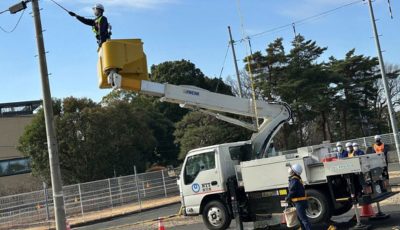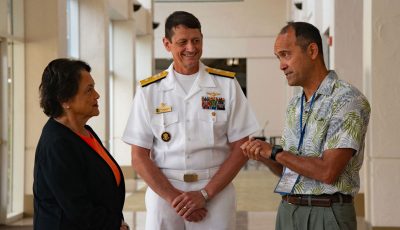Four amicus briefs filed in case about birthright citizenship in US territories
Does the Constitution guarantee citizenship to people born in U.S. territories?
That is the question before the U.S. Court of Appeals for the District of Columbia in the landmark case Tuaua v. United States. On Monday, prominent elected officials, scholars, and policy leaders filed a total of four amicus (“friend of the court”) briefs to assist the Court of Appeals as it addresses these issues, each represented on a pro bono basis by a prominent national firm. Among those filing in support of the case were Delegate Madeleine Z. Bordallo (D-GU), former Guam governor Carl Gutierrez, and former Assistant Secretary of Interior for Insular Areas Tony Babauta.
“I thank Congresswoman Bordallo, Governor Gutierrez, and Assistant Secretary Babauta for their support of equal citizenship in U.S. territories. Their leadership over the years has helped set the stage for our advocacy toward equal rights for all Americans, wherever one lives,” said Neil Weare, president of We the People Project, who, along with attorneys at Arnold & Porter LLP and attorney Charles V. Ala’ilima, represents Lene Tuaua, the Los Angeles-based Samoan Federation of America, and others in their challenge of federal laws that label individuals born in American Samoa as “nationals, but not citizens, of the United States.”
Filing in support of the plaintiffs were Members of Congress and former government officials from Guam, the U.S. Virgin Islands, and Puerto Rico, represented by Covington & Burling LLP; David Cohen, represented by Jenner & Block LLP; and citizenship scholars represented by Gibson, Dunn & Crutcher LLP. Finally, scholars of constitutional law and legal history, represented by Wilmer Cutler Pickering Hale and Dorr LLP, filed on behalf of neither party, but pushed back against the government’s argument that a series of controversial Plessy-era decisions known as the Insular Cases should answer this case.
The perspectives and experiences of other U.S. territories were the focus of a brief filed by Bordallo and U.S. Virgin Islands Delegate Donna Christensen, along with former governors Gutierrez (Guam), Pedro Rossello (Puerto Rico), and Charles Turnbull (Virgin Islands), as well as Babauta.
“So long as Guam and other U.S. territories are part of the United States, citizenship by birth should be recognized as a right guaranteed by the Constitution, not a mere privilege extended by Congress,” said Bordallo.
“Nearly 600 soldiers from Guam recently returning home from Afghanistan, in fact, more than 125,000 veterans call a U.S. territory home. It’s about time the federal government stops arguing that Guam and these other territories aren’t really part of the United States when it comes to important rights and benefits,” said Gutierrez, who, in addition to many other accomplishments in the area of federal-territorial affairs, served as president of the first federally recognized Constitutional Convention in 1977.
“The idea that people born in a U.S. territory can be denied full and equal U.S. citizenship is a relic of another era and makes no sense for our country in the 21st century,” said former Assistant Secretary Babauta.
Their amicus brief explains how birthright citizenship has benefited residents of Puerto Rico, Guam, the Virgin Islands, and the Northern Mariana Islands without displacing what makes each of these areas unique.
David Cohen, an attorney of Samoan heritage who served as Deputy Assistant Secretary of Interior overseeing the Office of Insular Affairs from 2002 to 2008, filed a brief that addresses the human impact “non-citizen national” status has on the lives of those born in American Samoa. Cohen’s brief outlines how tens of thousands of “non-citizen nationals” living throughout the United States are denied basic rights like the rights to vote, serve on juries, and bear arms. “Non-citizen nationals” are even denied certain career opportunities in government and military service.
Addressing the history and importance of birthright citizenship in the United States are Professors Sam Erman, Nathan Perl-Rosenthal, Holly Brewer, Linda Bosniak, Kristin Collins, Rose Cuison-Villazor, Stella Elias, Linda Kerber, Bernadette Meyler, Michael Ramsey, Lucy Salyer, Rogers Smith, and Charles Venator-Santiago. They argue that the common law understanding of birthright citizenship supports recognition of citizenship by birth throughout the United States, including U.S. territories. Their brief highlights that the only judicially recognized exception to this principle was the Supreme Court’s infamous decision in Dred Scott v. Sanford, which denied citizenship to African-Americans, and which was later overturned by the Fourteenth Amendment.
Professors Christina Duffy Ponsa, Gary Lawson, Sanford Levinson, Bartholomew H. Sparrow, and Andrew Kent, filing on behalf of neither party, argue that the government’s reliance on the Insular Cases is misplaced. They argue that the Insular Cases doctrine is irrelevant to determining the Citizenship Clause’s geographic scope and demonstrate why the courts should not endorse an expansion of the Insular Cases’ controversial incorporation doctrine. (In February, several of these amici participated in Harvard Law School’s “Revisiting the Insular Cases” conference where Judge Torruella argued that “[t]he Insular Cases represent classic Plessy v. Ferguson legal doctrine…that should be totally eradicated from present day constitutional reasoning.”)
Last June, the D.C. District Court dismissed the Tuaua lawsuit, and the plaintiffs appealed to the D.C. Circuit. This February, the D.C. Circuit denied the federal government’s motion to dispose of the appeal before full briefing.
The federal government will file its brief later this summer, as will the American Samoa government and the territory’s delegate, who have moved to intervene in the appeal. If the D.C. Circuit holds oral argument, it is expected to take place later this year. (We the People Project)



























